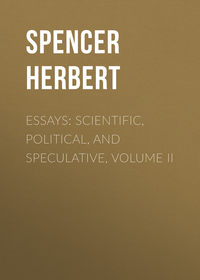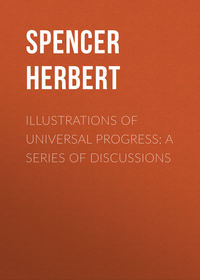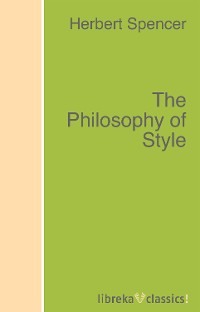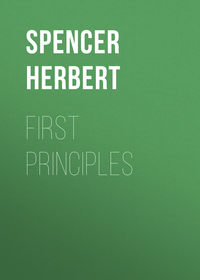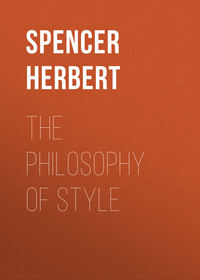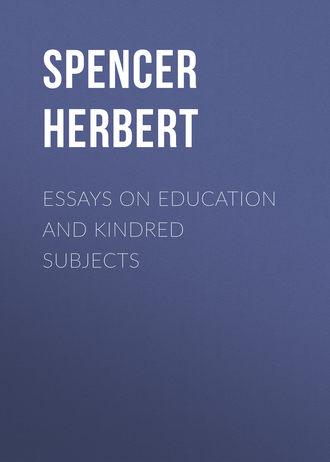 полная версия
полная версияEssays on Education and Kindred Subjects
This empirical geometry which presents an endless series of problems, should be continued along with other studies for years; and may throughout be advantageously accompanied by those concrete applications of its principles which serve as its preliminary. After the cube, the octahedron, and the various forms of pyramid and prism have been mastered, may come the more complex regular bodies – the dodecahedron and icosahedron – to construct which out of single pieces of cardboard, requires considerable ingenuity. From these, the transition may naturally be made to such modified forms of the regular bodies as are met with in crystals – the truncated cube, the cube with its dihedral as well as its solid angles truncated, the octahedron and the various prisms as similarly modified: in imitating which numerous forms assumed by different metals and salts, an acquaintance with the leading facts of mineralogy will be incidentally gained.1
After long continuance in exercises of this kind, rational geometry, as may be supposed, presents no obstacles. Habituated to contemplate relationships of form and quantity, and vaguely perceiving from time to time the necessity of certain results as reached by certain means, the pupil comes to regard the demonstrations of Euclid as the missing supplements to his familiar problems. His well-disciplined faculties enable him easily to master its successive propositions, and to appreciate their value; and he has the occasional gratification of finding some of his own methods proved to be true. Thus he enjoys what is to the unprepared a dreary task. It only remains to add, that his mind will presently arrive at a fit condition for that most valuable of all exercises for the reflective faculties – the making of original demonstrations. Such theorems as those appended to the successive books of the Messrs. Chambers's Euclid, will soon become practicable to him; and in proving them, the process of self-development will be not intellectual only, but moral.
To continue these suggestions much further, would be to write a detailed treatise on education, which we do not purpose. The foregoing outlines of plans for exercising the perceptions in early childhood, for conducting object-lessons, for teaching drawing and geometry, must be considered simply as illustrations of the method dictated by the general principles previously specified. We believe that on examination they will be found not only to progress from the simple to the complex, from the indefinite to the definite, from the concrete to the abstract, from the empirical to the rational; but to satisfy the further requirements, that education shall be a repetition of civilisation in little, that it shall be as much as possible a process of self-evolution, and that it shall be pleasurable. The fulfilment of all these conditions by one type of method, tends alike to verify the conditions, and to prove that type of the method the right one. Mark too, that this method is the logical outcome of the tendency characterising all modern improvements in tuition – that it is but an adoption in full of the natural system which they adopt partially – that it displays this complete adoption of the natural system, both by conforming to the above principles, and by following the suggestions which the unfolding mind itself gives: facilitating its spontaneous activities, and so aiding the developments which Nature is busy with. Thus there seems abundant reason to conclude, that the mode of procedure above exemplified, closely approximates to the true one.
A few paragraphs must be added in further inculcation of the two general principles, that are alike the most important and the least attended to; namely, the principle that throughout youth, as in early childhood and in maturity, the process shall be one of self-instruction; and the obverse principle, that the mental action induced shall be throughout intrinsically grateful. If progression from simple to complex, from indefinite to definite, and from concrete to abstract, be considered the essential requirements as dictated by abstract psychology; then do the requirements that knowledge shall be self-mastered, and pleasurably mastered, become tests by which we may judge whether the dictates of abstract psychology are being obeyed. If the first embody the leading generalisations of the science of mental growth, the last are the chief canons of the art of fostering mental growth. For manifestly, if the steps in our curriculum are so arranged that they can be successively ascended by the pupil himself with little or no help, they must correspond with the stages of evolution in his faculties; and manifestly, if the successive achievements of these steps are intrinsically gratifying to him, it follows that they require no more than a normal exercise of his powers.
But making education a process of self-evolution, has other advantages than this of keeping our lessons in the right order. In the first place, it guarantees a vividness and permanency of impression which the usual methods can never produce. Any piece of knowledge which the pupil has himself acquired – any problem which he has himself solved, becomes, by virtue of the conquest, much more thoroughly his than it could else be. The preliminary activity of mind which his success implies, the concentration of thought necessary to it, and the excitement consequent on his triumph, conspire to register the facts in his memory in a way that no mere information heard from a teacher, or read in a school-book, can be registered. Even if he fails, the tension to which his faculties have been wound up, insures his remembrance of the solution when given to him, better than half-a-dozen repetitions would. Observe, again, that this discipline necessitates a continuous organisation of the knowledge he acquires. It is in the very nature of facts and inferences assimilated in this normal manner, that they successively become the premises of further conclusions – the means of solving further questions. The solution of yesterday's problem helps the pupil in mastering to-day's. Thus the knowledge is turned into faculty as soon as it is taken in, and forthwith aids in the general function of thinking – does not lie merely written on the pages of an internal library, as when rote-learnt. Mark further, the moral culture which this constant self-help involves. Courage in attacking difficulties, patient concentration of the attention, perseverance through failures – these are characteristics which after-life specially requires; and these are characteristics which this system of making the mind work for its food specially produces. That it is thoroughly practicable to carry out instruction after this fashion, we can ourselves testify; having been in youth thus led to solve the comparatively complex problems of perspective. And that leading teachers have been tending in this direction, is indicated alike in the saying of Fellenberg, that "the individual, independent activity of the pupil is of much greater importance than the ordinary busy officiousness of many who assume the office of educators;" in the opinion of Horace Mann, that "unfortunately education amongst us at present consists too much in telling, not in training;" and in the remark of M. Marcel, that "what the learner discovers by mental exertion is better known than what is told to him."
Similarly with the correlative requirement, that the method of culture pursued shall be one productive of an intrinsically happy activity, – an activity not happy because of extrinsic rewards to be obtained, but because of its own healthfulness. Conformity to this requirement, besides preventing us from thwarting the normal process of evolution, incidentally secures positive benefits of importance. Unless we are to return to an ascetic morality (or rather im-morality) the maintenance of youthful happiness must be considered as in itself a worthy aim. Not to dwell upon this, however, we go on to remark that a pleasurable state of feeling is far more favourable to intellectual action than a state of indifference or disgust. Every one knows that things read, heard, or seen with interest, are better remembered than things read, heard, or seen with apathy. In the one case the faculties appealed to are actively occupied with the subject presented; in the other they are inactively occupied with it, and the attention is continually drawn away by more attractive thoughts. Hence the impressions are respectively strong and weak. Moreover, to the intellectual listlessness which a pupil's lack of interest in any study involves, must be added the paralysing fear of consequences. This, by distracting his attention, increases the difficulty he finds in bringing his faculties to bear upon facts that are repugnant to them. Clearly, therefore, the efficiency of tuition will, other things equal, be proportionate to the gratification with which tasks are performed.
It should be considered also, that grave moral consequences depend upon the habitual pleasure or pain which daily lessons produce. No one can compare the faces and manners of two boys – the one made happy by mastering interesting subjects, and the other made miserable by disgust with his studies, by consequent inability, by cold looks, by threats, by punishment – without seeing that the disposition of the one is being benefited and that of the other injured. Whoever has marked the effects of success and failure upon the mind, and the power of the mind over the body, will see that in the one case both temper and health are favourably affected, while in the other there is danger of permanent moroseness, or permanent timidity, and even of permanent constitutional depression. There remains yet another indirect result of no small moment. The relationship between teachers and their pupils is, other things equal, rendered friendly and influential, or antagonistic and powerless, according as the system of culture produces happiness or misery. Human beings are at the mercy of their associated ideas. A daily minister of pain cannot fail to be regarded with secret dislike; and if he causes no emotions but painful ones, will inevitably be hated. Conversely, he who constantly aids children to their ends, hourly provides them with the satisfactions of conquest, hourly encourages them through their difficulties and sympathises in their successes, will be liked; nay, if his behaviour is consistent throughout, must be loved. And when we remember how efficient and benign is the control of a master who is felt to be a friend, when compared with the control of one who is looked upon with aversion, or at best indifference, we may infer that the indirect advantages of conducting education on the happiness principle do not fall far short of the direct ones. To all who question the possibility of acting out the system here advocated, we reply as before, that not only does theory point to it, but experience commends it. To the many verdicts of distinguished teachers who since Pestalozzi's time have testified this, may be here added that of Professor Pillans, who asserts that "where young people are taught as they ought to be, they are quite as happy in school as at play, seldom less delighted, nay, often more, with the well-directed exercise of their mental energies than with that of their muscular powers."
As suggesting a final reason for making education a process of self-instruction, and by consequence a process of pleasurable instruction, we may advert to the fact that, in proportion as it is made so, is there a probability that it will not cease when schooldays end. As long as the acquisition of knowledge is rendered habitually repugnant, so long will there be a prevailing tendency to discontinue it when free from the coercion of parents and masters. And when the acquisition of knowledge has been rendered habitually gratifying, then will there be as prevailing a tendency to continue, without superintendence, that self-culture previously carried on under superintendence. These results are inevitable. While the laws of mental association remain true – while men dislike the things and places that suggest painful recollections, and delight in those which call to mind by-gone pleasures – painful lessons will make knowledge repulsive, and pleasurable lessons will make it attractive. The men to whom in boyhood information came in dreary tasks along with threats of punishment, and who were never led into habits of independent inquiry, are unlikely to be students in after years; while those to whom it came in the natural forms, at the proper times, and who remember its facts as not only interesting in themselves, but as the occasions of a long series of gratifying successes, are likely to continue through life that self-instruction commenced in youth.
MORAL EDUCATION
The greatest defect in our programmes of education is entirely overlooked. While much is being done in the detailed improvement of our systems in respect both of matter and manner, the most pressing desideratum has not yet been even recognised as a desideratum. To prepare the young for the duties of life is tacitly admitted to be the end which parents and schoolmasters should have in view; and happily, the value of the things taught, and the goodness of the methods followed in teaching them, are now ostensibly judged by their fitness to this end. The propriety of substituting for an exclusively classical training, a training in which the modern languages shall have a share, is argued on this ground. The necessity of increasing the amount of science is urged for like reasons. But though some care is taken to fit youth of both sexes for society and citizenship, no care whatever is taken to fit them for the position of parents. While it is seen that for the purpose of gaining a livelihood, an elaborate preparation is needed, it appears to be thought that for the bringing up of children, no preparation whatever is needed. While many years are spent by a boy in gaining knowledge of which the chief value is that it constitutes "the education of a gentleman;" and while many years are spent by a girl in those decorative acquirements which fit her for evening parties; not an hour is spent by either in preparation for that gravest of all responsibilities – the management of a family. Is it that this responsibility is but a remote contingency? On the contrary, it is sure to devolve on nine out of ten. Is it that the discharge of it is easy? Certainly not: of all functions which the adult has to fulfil, this is the most difficult. Is it that each may be trusted by self-instruction to fit himself, or herself, for the office of parent? No: not only is the need for such self-instruction unrecognised, but the complexity of the subject renders it the one of all others in which self-instruction is least likely to succeed. No rational plea can be put forward for leaving the Art of Education out of our curriculum. Whether as bearing on the happiness of parents themselves, or whether as affecting the characters and lives of their children and remote descendants, we must admit that a knowledge of the right methods of juvenile culture, physical, intellectual, and moral, is a knowledge of extreme importance. This topic should be the final one in the course of instruction passed through by each man and woman. As physical maturity is marked by the ability to produce offspring, so mental maturity is marked by the ability to train those offspring. The subject which involves all other subjects, and therefore the subject in which education should culminate, is the Theory and Practice of Education.
In the absence of this preparation, the management of children, and more especially the moral management, is lamentably bad. Parents either never think about the matter at all, or else their conclusions are crude and inconsistent. In most cases, and especially on the part of mothers, the treatment adopted on every occasion is that which the impulse of the moment prompts: it springs not from any reasoned-out conviction as to what will most benefit the child, but merely expresses the dominant parental feelings, whether good or ill; and varies from hour to hour as these feelings vary. Or if the dictates of passion are supplemented by any definite doctrines and methods, they are those handed down from the past, or those suggested by the remembrances of childhood, or those adopted from nurses and servants – methods devised not by the enlightenment, but by the ignorance, of the time. Commenting on the chaotic state of opinion and practice relative to family government, Richter writes: —
"If the secret variances of a large class of ordinary fathers were brought to light, and laid down as a plan of studies and reading, catalogued for a moral education, they would run somewhat after this fashion: – In the first hour 'pure morality must be read to the child, either by myself or the tutor;' in the second, 'mixed morality, or that which may be applied to one's own advantage;' in the third, 'do you not see that your father does so and so?' in the fourth, 'you are little, and this is only fit for grown-up people;' in the fifth, 'the chief matter is that you should succeed in the world, and become something in the state;' in the sixth, 'not the temporary, but the eternal, determines the worth of a man;' in the seventh, 'therefore rather suffer injustice, and be kind;' in the eighth, 'but defend yourself bravely if any one attack you;' in the ninth, 'do not make a noise, dear child;' in the tenth, 'a boy must not sit so quiet;' in the eleventh, 'you must obey your parents better;' in the twelfth, 'and educate yourself.' So by the hourly change of his principles, the father conceals their untenableness and onesidedness. As for his wife, she is neither like him, nor yet like that harlequin who came on to the stage with a bundle of papers under each arm, and answered to the inquiry, what he had under his right arm, 'orders,' and to what he had under his left arm, 'counter-orders.' But the mother might be much better compared to a giant Briareus, who had a hundred arms, and a bundle of papers under each."
This state of things is not to be readily changed. Generations must pass before a great amelioration of it can be expected. Like political constitutions, educational systems are not made, but grow; and within brief periods growth is insensible. Slow, however, as must be any improvement, even that improvement implies the use of means; and among the means is discussion.
We are not among those who believe in Lord Palmerston's dogma, that "all children are born good." On the whole, the opposite dogma, untenable as it is, seems to us less wide of the truth. Nor do we agree with those who think that, by skilful discipline, children may be made altogether what they should be. Contrariwise, we are satisfied that though imperfections of nature may be diminished by wise management, they cannot be removed by it. The notion that an ideal humanity might be forthwith produced by a perfect system of education, is near akin to that implied in the poems of Shelley, that would mankind give up their old institutions and prejudices, all the evils in the world would at once disappear: neither notion being acceptable to such as have dispassionately studied human affairs.
Nevertheless, we may fitly sympathise with those who entertain these too sanguine hopes. Enthusiasm, pushed even to fanaticism, is a useful motive-power – perhaps an indispensable one. It is clear that the ardent politician would never undergo the labours and make the sacrifices he does, did he not believe that the reform he fights for is the one thing needful. But for his conviction that drunkenness is the root of all social evils, the teetotaler would agitate far less energetically. In philanthropy, as in other things, great advantage results from division of labour; and that there may be division of labour, each class of philanthropists must be more or less subordinated to its function – must have an exaggerated faith in its work. Hence, of those who regard education, intellectual or moral, as the panacea, we may say that their undue expectations are not without use; and that perhaps it is part of the beneficent order of things that their confidence cannot be shaken.
Even were it true, however, that by some possible system of moral control, children could be moulded into the desired form; and even could every parent be indoctrinated with this system, we should still be far from achieving the object in view. It is forgotten that the carrying out of any such system presupposes, on the part of adults, a degree of intelligence, of goodness, of self-control, possessed by no one. The error made by those who discuss questions of domestic discipline, lies in ascribing all the faults and difficulties to the children, and none to the parents. The current assumption respecting family government, as respecting national government, is, that the virtues are with the rulers and the vices with the ruled. Judging by educational theories, men and women are entirely transfigured in their relations to offspring. The citizens we do business with, the people we meet in the world, we know to be very imperfect creatures. In the daily scandals, in the quarrels of friends, in bankruptcy disclosures, in lawsuits, in police reports, we have constantly thrust before us the pervading selfishness, dishonesty, brutality. Yet when we criticise nursery-management and canvass the misbehaviour of juveniles, we habitually take for granted that these culpable persons are free from moral delinquency in the treatment of their boys and girls! So far is this from the truth, that we do not hesitate to blame parental misconduct for a great part of the domestic disorder commonly ascribed to the perversity of children. We do not assert this of the more sympathetic and self-restrained, among whom we hope most of our readers may be classed; but we assert it of the mass. What kind of moral culture is to be expected from a mother who, time after time, angrily shakes her infant because it will not suck; which we once saw a mother do? How much sense of justice is likely to be instilled by a father who, on having his attention drawn by a scream to the fact that his child's finger is jammed between the window-sash and sill, begins to beat the child instead of releasing it? Yet that there are such fathers is testified to us by an eye-witness. Or, to take a still stronger case, also vouched for by direct testimony – what are the educational prospects of the boy who, on being taken home with a dislocated thigh, is saluted with a castigation? It is true that these are extreme instances – instances exhibiting in human beings that blind instinct which impels brutes to destroy the weakly and injured of their own race. But extreme though they are, they typify feelings and conduct daily observable in many families. Who has not repeatedly seen a child slapped by nurse or parent for a fretfulness probably resulting from bodily derangement? Who, when watching a mother snatch up a fallen little one, has not often traced, both in the rough manner and in the sharply-uttered exclamation – "You stupid little thing!" – an irascibility foretelling endless future squabbles? Is there not in the harsh tones in which a father bids his children be quiet, evidence of a deficient fellow-feeling with them? Are not the constant, and often quite needless, thwartings that the young experience – the injunctions to sit still, which an active child cannot obey without suffering great nervous irritation, the commands not to look out of the window when travelling by railway, which on a child of any intelligence entails serious deprivation – are not these thwartings, we ask, signs of a terrible lack of sympathy? The truth is, that the difficulties of moral education are necessarily of dual origin – necessarily result from the combined faults of parents and children. If hereditary transmission is a law of nature, as every naturalist knows it to be, and as our daily remarks and current proverbs admit it to be; then, on the average of cases, the defects of children mirror the defects of their parents; – on the average of cases, we say, because, complicated as the results are by the transmitted traits of remoter ancestors, the correspondence is not special but only general. And if, on the average of cases, this inheritance of defects exists, then the evil passions which parents have to check in their children, imply like evil passions in themselves: hidden, it may be, from the public eye, or perhaps obscured by other feelings, but still there. Evidently, therefore, the general practice of any ideal system of discipline is hopeless: parents are not good enough.


